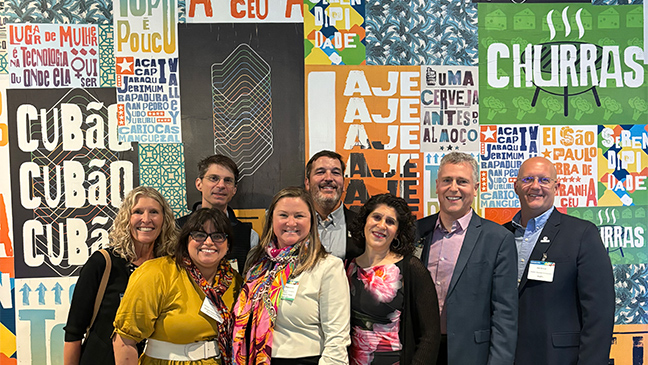St. Louis: A Hub for Agtech and Geospatial Innovation
St. Louis is rapidly emerging as a powerhouse at the confluence of agtech and geospatial technology. With prominent research engines like the Danforth Plant Science Center and the Taylor Geospatial Institute (TGI), alongside organizations such as BioSTL, 39 North, T-REX, Arch Grants and GeoFutures, the region has cultivated a thriving ecosystem aimed at enhancing agricultural sustainability and global food security.
Building Global Relationships
Much like the continental United States, countries across Latin America are major producers of crops that feed the world. For years, St. Louis leaders have been forging relationships with agtech partners in Latin America in partnership with The Yield Lab Latam. In 2023, these efforts intensified with the launch of Cultivar STL, an initiative designed to boost the economic success of startups, investors, corporations, and ecosystems in both St. Louis and Latin America. Over the past year, more than 70 people from 49 organizations across 10 Latin American countries have participated in Cultivar events.
The Future of Agri-Food Tech: STLMADE
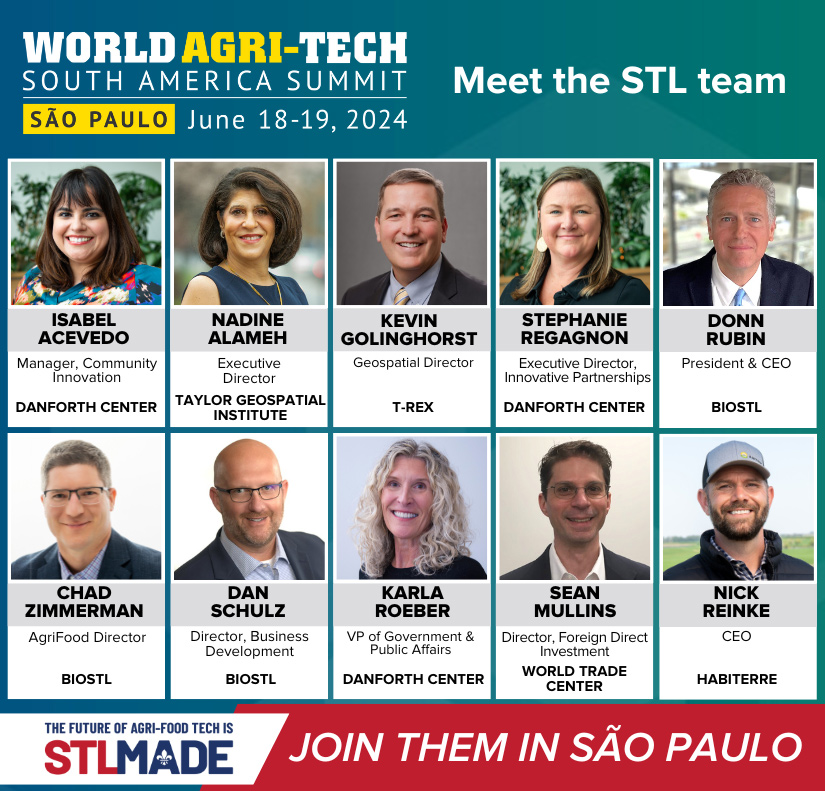
On June 17, a delegation of 10 regional leaders in the ag and geospatial sectors traveled to São Paulo, Brazil under the banner "The Future of Agri-Food Tech is STLMADE" to participate in the annual World Agri-Tech South America Summit and visit São José dos Campos's burgeoning geospatial ecosystem. The delegation was welcomed by Daniel Scioli, the Argentine Ambassador to Brazil, at his home for a reception and networking with several companies.
“Unlike our first visit to São Paulo, where everything was new and uncertain, this time, we walked in backed by significant progress and real outcomes we've achieved over the past year,” said Isabel Acevedo, manager Community Innovation at the Danforth Center. “Having our geospatial partners at TGI and T-Rex join us this year elevated our presence to the next level.”
Panel Discussions: Challenges and Opportunities
The World Agri-Tech South America Summit brought together 700 local and international players in South America’s dynamic agri-food ecosystem, including cooperatives, agribusinesses, food corporations, startups, investors, and government agencies.
The delegation hosted a Breakout Session titled "STL: The Gateway to AgTech and Climate Innovation," moderated by Stephanie Regagnon, executive director of Innovation Partnerships at the Danforth Center. After setting the stage with the history of the Danforth Center and the region’s agtech innovation ecosystem, Regagnon introduced panelists including TGI Executive Director Nadine Alameh, Ana Indart from Elytron and Pedro Hales from Grupo Ria. The discussion quickly became lively, highlighting the synergy between agtech and geospatial technology and its potential to unlock innovation across the Americas.
Alameh, attending her first event focused solely on agriculture, expressed her excitement about leveraging geospatial technology to accelerate sustainable agriculture. She also shared details about TGI’s new Global Food Security Challenge, which includes an ideation phase designed to identify key challenges and initial seed funding opportunities.
Hales shared insights about his farm operation Grupo Ria, and their partnership with BioSTL’s Early Adopter Grower Innovation Community (EAGIC) program to test new technologies in various agronomic conditions. Indart reflected on Elytron’s decision to sign a business development partnership with BioSTL because of the access it provides to customers and collaborators. She also shared that Elytron’s participation in Cultivar led to a partnership with Mastera to stimulate the development of new bioinputs in Brazil.
“We have a lot to learn about how innovators engage with farmers in South America,” said Regagnon. “And we need to work together as a constellation of global innovation ecosystems to move the needle on climate challenges and food security.”
Alameh moderated a mainstage panel, The Smart Farming Adoption Challenge: Increasing Yield and Efficiency Through Data and Machinery Integration, featuring five seasoned experts from BASF, TIM, AGCO, John Deere and Earthdaily Agro, who are driving new digital farming solutions from planting to harvest and the logistics that enable delivery of food to consumers.
Alameh opened the standing room only session by reflecting on her positive impressions of the engagement and excitement around the agtech sector and its strong connectivity to the geospatial industry.
“What could be more important than securing humanity's access to a sustainable food source?” Alameh stated. “TGI's Food Security Challenge speaks to the centrality of this global issue. Amazing leaders trying to make our world a greener, more sustainable planet and eventually making smart farming simply farming.”
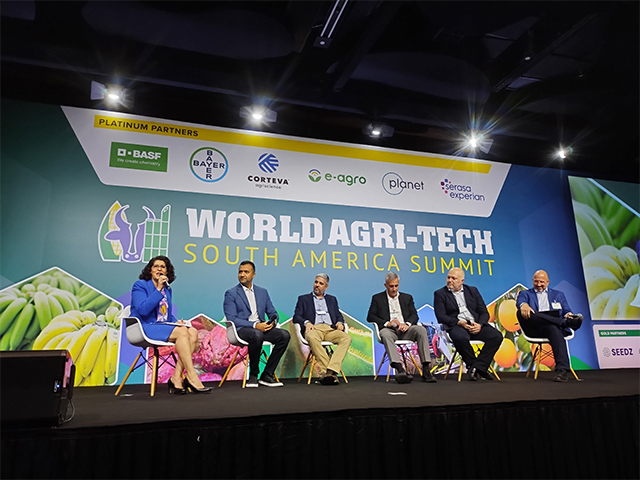
The panelists shared the focus and value proposition of their digital ag businesses and emphasized the importance of farmer first solutions to increase yield and reduce weeds and pests for greater impact.
“This panel is as much about the development of leading digital tech as it is about working together to deliver solutions to farmers,” Alameh said.
Panelists agreed that introducing producers to evolving digital technology is an important challenge that needs to be addressed to enable tech adoption. Satellite imagery is critical to scalability, but today, digital ag is generating more data than is often possible to handle. Finding ways to bring farmers the key pieces of data they need without all the noise will be critical to the acceptance of new digital technologies.
Chad Zimmerman and Dan Schulz from BioSTL, Kevin Golinghorst from T-REX, Sean Mullins from the World Trade Center St. Louis and Nick Reinke, CEO of Habiterre held dozens of meetings with companies and investors during the Summit.
"The participation of the St. Louis delegation at World AgriTech São Paulo has been invaluable,” said Tom Bennett, head of business development ReThink Events – Latam. “You serve as a vital bridge between technological innovation in agtech across Latin America and the United States. Your presence and contributions have greatly enriched the event."
Focus on the Future
On the closing day of the summit, the Danforth Center, BioSTL, and The Yield Lab Latam signed a Memorandum of Understanding (MOU) as part of the ongoing momentum of Cultivar. The MOU outlines key activities such as:
- Linking startups and corporate partners for potential business development connections
- Promoting early-adopter farmer/grower exchanges and learning opportunities
- Strengthening support for emerging companies looking to expand across geographies
- Encouraging ecosystem learning, sharing, and capacity building through delegations and visits between regions
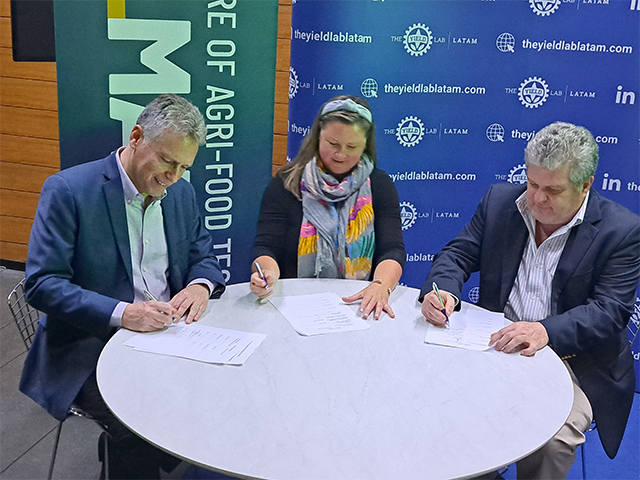
“St. Louis showed up in a significant way in São Paulo,” said Donn Rubin, president and CEO, BioSTL. The promise of this new collaboration between BioSTL, the Danforth Center and Latin American accelerator/venture investor The Yield Lab Latam is very exciting.”
“Signing an MOU is simply a more formal way to signal our commitment to the work of Cultivar. St. Louis organizations have been working together building these bridges for seven years in some cases,” emphasized Regagnon. “As of 2023 this focused and sustained effort now has a name and it’s exciting to more visibly commit to next steps and increasingly impactful outcomes for our regions and for the world.”
Geospatial Deep Dive in Brazil
Following the summit, the delegation visited Parque de Inovação Tecnológica (PIT) in São José dos Campos for Cultivar: Geospatial Deep Dive in Brazil Agribusiness. Hosted by PIT with support from The Yield Lab Latam and the Danforth Center, the event explored the intersection of aerospace and agtech, aiming to catalyze collaboration and innovation across the Americas. Attendees included 41 individuals representing 25 organizations in five countries.
The agenda included participation in Agro do Futuro, an introduction to Brazil’s geospatial agtech ecosystem by EMBRAPA, visits to Visiona and CEMADEM, and an overview of the accomplishments of the Cultivar initiative by Acevedo and Teresita Di Marco, principal at The Yield Lab Latam. Alameh highlighted the immediate opportunity to engage the Cultivar network in TGI’s Global Food Security Challenge.
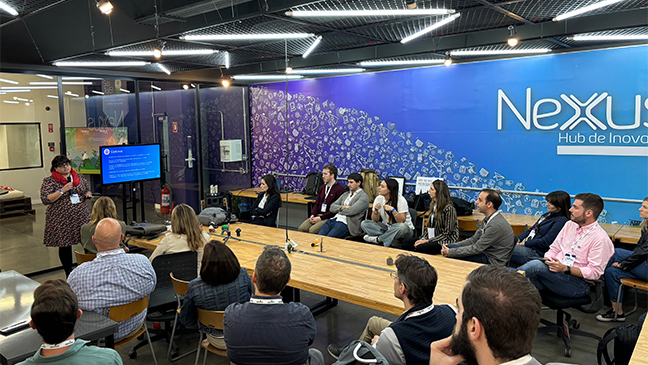
“By engaging with other innovation ecosystems such as the Parque de Inovação Tecnológica (PIT) in São José dos Campos, we were able to create and build upon relationships with other innovators that have the potential to multiply the impact of our individual efforts,” said Reinke. “I came away inspired by the innovations I saw there and by the power our St. Louis ecosystem has to create these connections.”
“The focus on integrating emerging geospatial capabilities in AgTech emphasized the importance of St. Louis’ role in bringing value to the United States in both sectors but also across the Americas,” said Kevin Golinghorst, interim director, T-REX.
Reflections and Future Prospects
Reflecting on the overall experience, Alameh said, “The Future of Agri-Food Tech is STLMADE team packaged the energy of our community and shared it with everyone at the World Agri-Tech and PIT. I was blown away by the entrepreneurial scene between Brazil and Argentina. So many smart scientists, technologists, knowledgeable VCs, and brave entrepreneurs!”
“Attending this event alongside our STL ecosystem partners significantly enhanced our quality of engagements with current and prospective startup companies”, said Dan Schulz, director business development BioSTL. “The opportunity enabled company leaders to personally experience the robust R&D and commercial development resources available in St. Louis whether solving for problems through biotech, digital agriculture, or more traditional agricultural inputs.”
“The global reach of the St. Louis agtech and geospatial innovation ecosystem is truly incredible, and we are honored to be a part of it,” said Reinke. “No one entity or ecosystem alone can address the grand challenges of sustainability, climate impact, and food security alone, and it gives me great hope for our future to see the work of other innovators and the way we can complement each other."
“In recent years, the region’s efforts to connect to the agetch sector in Latin America have flourished, leading to increased business development, enriched academic programs, and enhanced ecosystem connectivity,” said Chad Zimmerman, agrifood director, BioSTL.
“We do not have a monopoly on innovation in the United States and I was truly impressed with both the World Agri-Tech Conference and the entrepreneurial ecosystems that we visited in Brazil,” said Golinghorst. They are supporting start-ups and small businesses in Latin America, as we are working hard to support innovation at T-REX, Cortex, 39 North, and other nodes across the St. Louis Region.”
“The trip was an excellent opportunity to showcase St. Louis in Latam with a particular focus on engagement and getting to know LATAM agtech players,” said Sean Mullins, director Foreign Direct Investment, World Trade Center. “Increasingly, agtech interests have merged with geospatial interests and our visit to Brazil sought to explore Latin American agtech and geospatial offerings so including Nadine, and Kevin was a great idea. I hope we can encourage more St. Louis companies to travel with us to World Agri-Tech in 2025 to intensify the direct bi-directional business relationships we are seeking to foster.”
As St. Louis continues to build on these collaborations, the future looks bright for agtech and geospatial innovation, promising significant advancements in sustainable agriculture and global food security.
In August agtech leaders will travel to Buenos Aires and Rosario, Argentina for the next Cultivar gathering. Read more on that work on our blog when they return!
